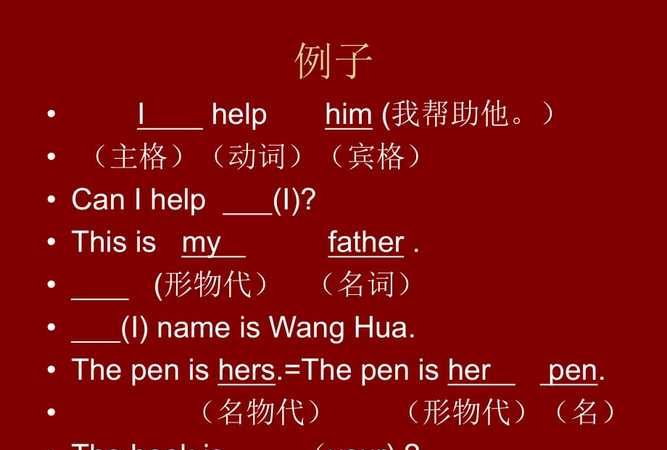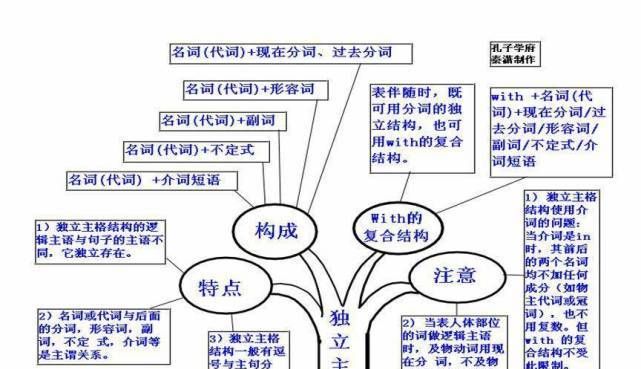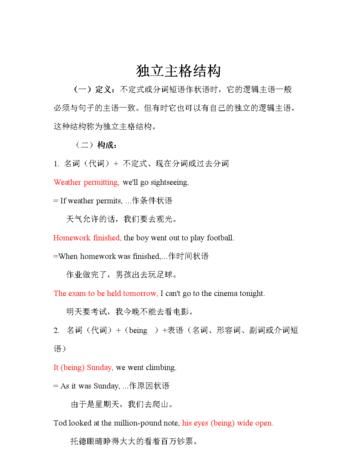本文目录
如何理解独立主格
独立主格结构是指用一个短语来表达相当于句子的概念,独立指其单独表达一近似完整的概念,主格指它用名词代词 来充当逻辑主语,说它是是指这个名词代词,是后边动作的发出者 独立主格结构可以化简复合句。将从句化为独立主格结构。这种化简是在 从句主语与主句主语不同时才可以进行。从句主语充当独立主格结构的逻辑主语。
独立主格的构成:逻辑主语 (名词 代词)+ 分词 (现在分词,过去分词,以及形容词、副词、介词短语等)
独立主格结构。通常作状语。用来表示 时间 条件 原因 方式 等。
如:
Weather permitting, we will have a picnic tomorrow.
若是天气许可,我们明天要去野餐。
还原后:If the weather permits, we will have a picnic tomorrow.
其中,weather permitting就是一个独立主格结构,其形式就是主语+分词短语。
又如:
The sun having set, we started for home.
=As the sun had set, we started for home.
夕阳西下了,我们就动身回家。
再如:
Gun in hand, he fears nothing.
枪在手,他什么也不怕。


什么是独立主格结构
独立主格是由名词和代词加上分词等构成的一种独立结构,用于修饰整个句子。独立结构中的名词或代词与其后的分词等构成逻辑上的主谓关系。“独立主格结构”。
实质就是带有自己主语的非限制性状语从句。
构成: 名词(代词)+现在分词、过去分词;名词(代词)+形容词;名词(代词)+副词;名词(代词)+不定式;名词(代词) +介词短语构成。 特点:(1)独立主格结构的逻辑主语与句子的主语不同,它独立存在。2)名词或代词与后面的分词,形容词,副词,不定式,介词等是主谓关系。3)独立主格结构一般有逗号与主句分开。
1. 名词/主格代词+现在分词。
名词或代词通常是动作的执行者,与现在分词构成逻辑上的主谓关系,表示主动的或正在进行的动作如: The girl staring at him (= As the girl stared at him), he didn”t know what to say. 姑娘两眼望着他,他不知道说什么好。
2. 名词/主格代词+过去分词。
名词/主格代词与过去分词之间的动宾关系。名词或代词是动作的承受者,与过去分词构成逻辑上的动宾关系或系表结构,表示被动或已完成的动作如: The problems solved (= As the problems were solved), the quality has been improved. 随着问题的解决,质量已经提高了。 Her glasses broken (= Because her glasses were broken), she couldn”t see the words on the blackboard.
由于眼镜摔坏了,她看不见黑板上的字。
3. 名词/主格代词+不定式。
名词/主格代词与不定式之间是主谓关系,且强调的是一次具体性的动作。名词或主格代词通常是动作的执行者,表示将要发生的动作,常位于句首或句末如: He is going to make a model plane, some old parts to help.
借助于一些旧零件,他要做一个飞机模型。 They said good-bye to each other, one to go home, the other to go to the bookstore. 他们道别后,一个回了家,一个去了书店。
4. 名词/主格代词+形容词。常用来说明名词或代词的性质特征或所处的状态如: An air accident happened to the plane, nobody alive. 那架飞机遭遇了空难,无一人生还。 So many people absent, the meeting had to be called off. 这么多人缺席,会议不得不取消。
5. 名词/主格代词+副词。常用来说明名词或代词的性质特征或所处的状态如: The meeting over, they all went home. 会议一结束,他们就都回家了。
6. 名词/主格代词+介词短语。介词短语也是用来说明或代词的性质特征或所处的状态如: The boy goes to the classroom, book in hand.
那男孩手里拿着书去教室。 Mary was sitting near the fire, her back towards the door.
玛丽靠近火炉坐着,背对着门。
7. There being +名词(代词)如: There being nothing else to do, we went home.
没有别的事可做,我们就回家了。 There being no further business, I declare the meeting closed.
没有再要讨论的事了,我宣布散会。
8. It being +名词(代词)如: It being Christmas, the government offices were closed.
由于圣诞节的缘故,政府机关都休息。 It being a holiday, all the shops were shut.
由于今天是假日,所有商店都关门了。
介词with / without + 名词或代词 + 形容词、副词、介词短语、非谓语动词
1. with / without + 名词或代词 + 形容词
He spoke to us with his mouth full .
她口里含着食物跟我们说话。
2. with / without + 名词或代词 + 副词
He left the office with the lights on.
他离开了办公室,让灯亮着。
3. with / without + 名词或代词 + 介词短语
The engineer came with a notebook in his hand.
那个工程师手里拿着笔记本过来了。
4. with / without + 名词或代词 + -ing分词
Don’t brush your teeth with water running.
不要在刷牙时让水流着。
5. with / without + 名词或代词 + 动词不定式
With so much work to do, the manager felt very worried. 这么多工作要做,经理觉得很焦急。
6. with / without + 名词或代词 + 动词的过去分词(from ***)
With the road blocked, they had to turn back and ran round it in another way.
由于道路被堵,他们不得不转身从另一条路绕过去。
用法 独立主格结构主要表示谓语动词发生的时间、原因、条件或伴随情况等,相当于一个状语从句或并列句。 1. 用作时间状语:The work done (=After the work had been done), we went home. 工作完成后,我们就回家了。 2. 用作条件状语:Weather permitting (=If weather permits), they will go on an outing to the beach tomorrow. 如果天气允许的话,他们将在明天组织一次海滨小游。 3. 用作原因状语:An important lecture to be given tomorrow (=As an important lecture will be given tomorrow), the professor has to stay up late into the night. 因为明天要发表一个重要的演讲,教授不得不熬夜到很晚。
4. 用作伴随状语:He was lying on the grass, his hands crossed under his head (=and his hands were crossed under his head).
他躺在草地上,两手交叉枕在脑后。 5.表示补充说明:We redoubled our efforts, each man working like two.
我们加倍努力,一个人干两个人的活。 *注:独立主格结构表示时间、条件或原因时,相当于一个状语从句,一般放在句首,表示原因时还可放在句末;表伴随状况或补充说明时,相当于一个并列句,通常放于句末
使用独立主格结构的几点注意
1. 独立主格与状语从句的转换
当状语从句的主语与主句的主语不是指同一个对象时,可用独立主格结构取代状语从句,但不再保留连词。如:
After class was over (=Class being over / Class over), the students soon left the classroom.
下课后,学生很快离开了教室。
2. 不能省略being (having been)的情形
在下列两种情况下,独立主格结构中的being(或having been)不能省略:
(1) 独立主格结构的逻辑主语是代词时。如:
It being Sunday, we went to church.
因为是星期天,我们去了做礼拜。
(2) 在There being+名词的结构中。如:
There being no bus, we had to go home on foot.
因为没有公共汽车,所以我们不得不步行回家。
3. 通常不用物主代词或冠词
在“名词(或代词)+介词短语”构成的独立主格结构中,一般不用形容词性物主代词和冠词。如:
Miss Smith entered the classroom, book in hand.
史密斯先生走进了课室,手里拿着一本书。
比较with的复合结构:
Miss Smith entered the classroom, with a book in his hand.
4. 独立主格结构没有所有格形式
The chief-editor arriving, we began the meeting. 主编来了,我们开始开会。
比较动名词复合结构:
The chief-editor’s arriving made us very surprised.
5. 独立主格的时态问题
独立主格结构作时间或原因状语时,可用完成时,表示该动作发生在谓语之前。如:
The listeners having taken their seats, the concert began.听众坐好后,音乐会开始了。
Tom having been late over and over, his boss was very disappointed.由于汤姆一再迟到,他的老板非常失望。
独立主格结构与独立成分的异同
1、有些分词短语可以独立存在,在句子中没有逻辑上的主语,实际上已经变成了习惯用法。这些短语有:
Generally speaking 总的说来,Frankly speaking 坦率地说,Judging from 从……判断,Supposing 假设,等等。
① Generally speaking, the rule is very easy to understand. 总的说来,这条规则很容易懂。
②Judging from what he said, he must be an honest man. 由他所说的来判断,他一定是一个诚实的人。
2、有些固定短语是带 to 的不定式,表明说话人的立场或态度,在句中作独立成分。这些短语有: to be honest老实说,to be sure 确实,to tell you the truth 说实话,to cut a long story short 长话短说,to be frank 坦率地说,to make matters / things worse 更糟糕的是,等等。
① To tell you the truth, I made a mistake in the word spelling. 说实话,我犯了一个拼写错误。
② To make things worse, many of the men have gone off to cities in search of higher pay, leaving women from nearby villages to carry on with the work. 情况更糟的是,许多男人都去城市找工资较高的工作,而留下附近村庄的妇女来继续承担修复工作。
. 独立主格结构及分词短语作状语的异同
1、独立主格结构与分词短语都可以转换为状语从句。但是,独立主格结构转换为状语从句后,它有自己的逻辑主语,与主句的主语不一致(例①)。而分词短语转换为状语从句后,从句的主语与主句的主语一致(例②)。
① If time permits, we'd better have a holiday at weekends. 转换为:
Time permitting, we'd better have a holiday at weekends. 如果时间允许,我们最好周末去度假。
②When we see from the hilltop, we can find the city more beautiful.转换为:
Seeing from the hilltop, we can find the city more beautiful. 从山顶上看,我们发现这个城市更美了。
2、还必须注意,分词结构的逻辑主语并不总是和主句的主语一致,也可以是主句的其它成分,语法上称作"依着法则"(例①)。而如果一个分词结构在句子中找不到它的逻辑主语,语法上称作"悬垂分词"(例②)。
①Searching for the thief in the city, it had taken the policemen a long time. 在城市里搜查小偷,花费了警察很长一段时间。
② When planting these flowers, care must be taken not to damage the roots. (人们)种这些花时必须小心,不要损坏了花根。


以上就是关于独立主格形容词性物主代词 ,如何理解独立主格的全部内容,以及独立主格形容词性物主代词 的相关内容,希望能够帮到您。
